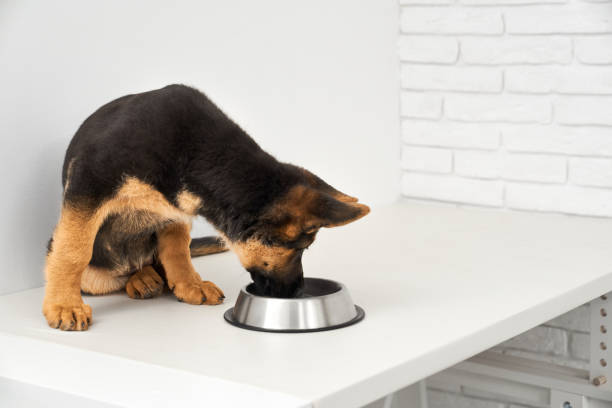Choosing the best puppy food for a German Shepherd is a big decision, and it can feel overwhelming. With so many options on the market, how do you pick the one that will keep your growing pup happy and healthy? From kibble to wet food, to homemade options and special feeding tips, this guide covers everything you need to know about feeding a German Shepherd puppy—from nutrition essentials to the best types of food, feeding schedules, and more.
Understanding German Shepherd Puppy Nutritional Needs
Why Nutrition Matters for German Shepherd Puppies

German Shepherd puppies are known for their intelligence, energy, and loyalty, but they also have specific dietary needs that go beyond the average puppy. Since they’re larger, more active, and faster-growing, German Shepherd puppies require food that supports their development. The right diet helps avoid developmental problems and ensures they grow into healthy adults with strong bones, muscles, and immune systems.
Key Nutrients to Look For in Puppy Food
Protein Needs for Growth and Strength
Protein is crucial for German Shepherd puppies. High-quality proteins from sources like chicken, lamb, fish, or beef fuel their growth and muscle development. While most dog foods contain a minimum of 18% protein, for a German Shepherd puppy, a protein level of 22-28% is ideal. Protein not only supports growth but also provides energy and helps maintain skin health.
Essential Vitamins and Minerals
German Shepherd puppies need a range of vitamins and minerals to develop strong bones, immune systems, and healthy skin. Calcium and phosphorus are vital for bone development and strength, while vitamins like D and E support the immune system and overall cell health. Other key minerals like zinc, iron, and potassium should be included to promote healthy growth.
Healthy Fats for Skin and Coat
Healthy fats, especially omega-3 and omega-6 fatty acids, are necessary for maintaining a glossy coat and healthy skin. Fish oil, flaxseed, and chicken fat are great sources of these fats. For German Shepherd puppies, about 10-15% of their diet should be fat, as it provides a dense source of energy and supports overall well-being.
Common Health Concerns in German Shepherd Puppies and How Diet Helps

German Shepherds are prone to specific health issues, such as hip dysplasia, bloat, and digestive sensitivities. Providing a high-quality diet with the right balance of nutrients can minimize the risk of these conditions. Diets rich in glucosamine and chondroitin, for example, help strengthen their joints, reducing the likelihood of hip dysplasia. Avoid foods with too many fillers or grains, as these can upset their digestion and contribute to bloating.
Types of best Puppy Food for German Shepherd
Dry Food (Kibble) Options
Dry food, or kibble, is popular due to its convenience, affordability, and dental benefits. The crunch of kibble helps keep your puppy’s teeth clean and gums healthy, reducing plaque buildup.
Best Dry Food Brands for German Shepherd Puppies
When selecting dry food, prioritize brands that use high-quality, natural ingredients without artificial preservatives. Here are some top choices:
- Royal Canin German Shepherd Puppy: Specially formulated for German Shepherds, it includes specific nutrients like glucosamine for joint health.
- Blue Buffalo Life Protection Puppy Formula: Known for its natural ingredients, it includes real meat, whole grains, and vegetables.
- Wellness Core Grain-Free Puppy: Ideal for puppies with sensitive stomachs, it’s packed with protein and free from grains.
Purina Pro Plan Puppy Large Breed: Offers an excellent blend of protein, vitamins, and minerals tailored for large-breed puppies like German Shepherds.
Wet Food Options

Wet food can be an appetizing choice, particularly for puppies that might be picky eaters. It’s hydrating and easy to digest, though often pricier than dry food.
Top Wet Food Options for German Shepherd Puppies
If you’re considering wet food, here are a few high-quality brands to look for:
- Hill’s Science Diet Puppy Wet Food: Rich in essential nutrients, it’s great for overall health and development.
- Wellness CORE Puppy Formula: Grain-free, with added vitamins and minerals to ensure balanced nutrition.
- Nutro Ultra Puppy Wet Dog Food: Made with real ingredients, Nutro’s blend is rich in animal protein and healthy fats.
Homemade Food for German Shepherd Puppies
Some owners prefer homemade food as it allows complete control over the ingredients. However, it’s essential to ensure the diet meets all nutritional needs. These simple recipes will guide you as you begin.
Sample Homemade Food Recipes
- Chicken and Veggie Mix
- Ingredients:1 cup cooked lean chicken, 1 cup boiled brown rice, 1 cup chopped carrots, 1 cup green beans, 1 teaspoon
- Preparation: Mix all ingredients and portion out for daily servings.
- Beef and Sweet Potato Bowl
- Ingredients: 1 lb. ground beef (cooked), 1 cup sweet potatoes (boiled), 1 cup spinach, 1 tsp. flaxseed oil.
- Preparation: Blend and portion for meals.
These meals are easy to make and can be frozen for future use, but always consult your vet before making homemade food a permanent choice.
Puppy Food Mixes: Combining Dry and Wet Food
Benefits of Mixing Wet and Dry Food
Mixing wet and dry food combines the benefits of both. Dry food helps with dental health, while wet food provides added moisture and a more appealing taste.
Recommended Ratios for Balanced Puppy Meals
A common approach is a 70-30 ratio: 70% dry food to 30% wet food. Adjust based on your puppy’s preferences or consult your vet for specific advice.
Creating a Puppy Food Chart for German Shepherds
How Much to Feed Based on Age and Weight
Most German Shepherd puppies need around 3-4 cups of food per day. Adjust amounts according to their weight and age:
- 8-12 weeks: 1-1.5 cups per meal, three times a day.
- 3-6 months: 1.5-2 cups per meal, three times a day.
- 6-12 months: 2-3 cups per meal, twice a day.
Feeding Schedule for Optimal Health
Creating a consistent feeding schedule is essential. Feed puppies three times a day until six months old, then transition to two meals per day. A regular schedule also helps prevent bloat, a common issue in German Shepherds.
Adjusting Portions as Your Puppy Grows
Increase portions gradually as your puppy gains weight, but avoid overfeeding to prevent obesity. Consult your vet every few months for advice on adjusting meal sizes.
Puppy Food Mixes: Combining Dry and Wet Food
Benefits of Mixing Wet and Dry Food
Mixing wet and dry food combines the benefits of both. Dry food helps with dental health, while wet food provides added moisture and a more appealing taste.
Recommended Ratios for Balanced Puppy Meals
A common approach is a 70-30 ratio: 70% dry food to 30% wet food. Adjust based on your puppy’s preferences or consult your vet for specific advice.
Creating a Puppy Food Chart for German Shepherds
How Much to Feed Based on Age and Weight
Most German Shepherd puppies need around 3-4 cups of food per day. Adjust amounts according to their weight and age:
- 8-12 weeks: 1-1.5 cups per meal, three times a day.
- 3-6 months: 1.5-2 cups per meal, three times a day.
- 6-12 months: 2-3 cups per meal, twice a day.
Feeding Schedule for Optimal Health
Creating a consistent feeding schedule is essential. Feed puppies three times a day until six months old, then transition to two meals per day. A regular schedule also helps prevent bloat, a common issue in German Shepherds.
Adjusting Portions as Your Puppy Grows
Increase portions gradually as your puppy gains weight, but avoid overfeeding to prevent obesity. Consult your vet every few months for advice on adjusting meal sizes.
Recommended Feeding Routine and Tips
How Often to Feed German Shepherd Puppies
Most puppies thrive on three meals daily until they’re about six months old, after which twice-daily feeding works best.
Best Times of Day for Meals
Feeding in the morning, midday, and early evening ensures your puppy has a steady source of energy throughout the day. For example:
- Morning: 7-8 AM
- Afternoon: 12-1 PM
- Evening: 5-6 PM
Tips to Keep Feeding Fun and Stress-Free
Make mealtime enjoyable with toys or puzzle feeders. Rotating between wet and dry food can add variety to their diet, keeping mealtime exciting.
Key Ingredients to Avoid in Puppy Food
Harmful Additives and Fillers
Stay away from foods with artificial preservatives such as BHA and BHT. Corn, wheat, and soy fillers should also be minimized as they don’t add nutritional value and may cause allergies.
Dangerous Foods for German Shepherd Puppies
Some human foods, such as chocolate, onions, garlic, and grapes, are toxic to puppies. Always check that treats or food don’t contain these ingredients, as even tiny amounts can be dangerous.
Transitioning to Adult Food: When and How
Recognizing When Your Puppy Is Ready for Adult Nutrition
German Shepherds are typically ready for adult food between 12-15 months. If your puppy is less interested in frequent meals or appears fully grown, they may be ready to switch.
Steps for a Smooth Transition
Introduce adult food slowly by combining it with their puppy food. Start with a 25% adult food to 75% puppy food ratio, gradually increasing the adult food proportion over 7-10 days.
FAQs
How Frequently Should I Feed My German Shepherd Puppy?
Feed younger puppies four times a day and gradually reduce it to two meals daily as they mature.
Can German Shepherd puppies eat human food safely?
Some human foods, like carrots, are safe but avoid chocolate, onions, and high-fat foods.
What Ingredients Should I Avoid in Puppy Food?
Avoid synthetic additives like colors, flavors, and preservatives, as well as fillers such as corn, wheat, and soy. These additives may upset your puppy’s stomach and offer little nutritional value. Look for foods with natural ingredients, as they’re better suited for sensitive digestive systems.
How can I tell if my puppy’s diet is properly balanced?
A balanced diet supports visible signs of health, like a shiny coat, high energy levels, and steady growth. If you’re unsure, consult your vet to help assess your puppy’s weight, overall health, and dietary needs.
When is the Right Time to Transition My German Shepherd to Adult Dog Food?
The transition to adult food generally happens between 12 and 15 months for German Shepherds. At this stage, switch gradually to high-quality adult dog food that meets the needs of large breeds. This ensures a smooth shift in nutrients as your puppy becomes an adult.
Conclusion
Feeding your German Shepherd puppy the right food is one of the best things you can do to set them up for a healthy, happy life. Choosing the best puppy food for German Shepherd puppies, whether dry, wet, or homemade, ensures they receive the balanced nutrition they need for growth, strong bones, a shiny coat, and endless energy. With this guide, you’re equipped to make informed decisions and give your German Shepherd puppy the best possible start.

